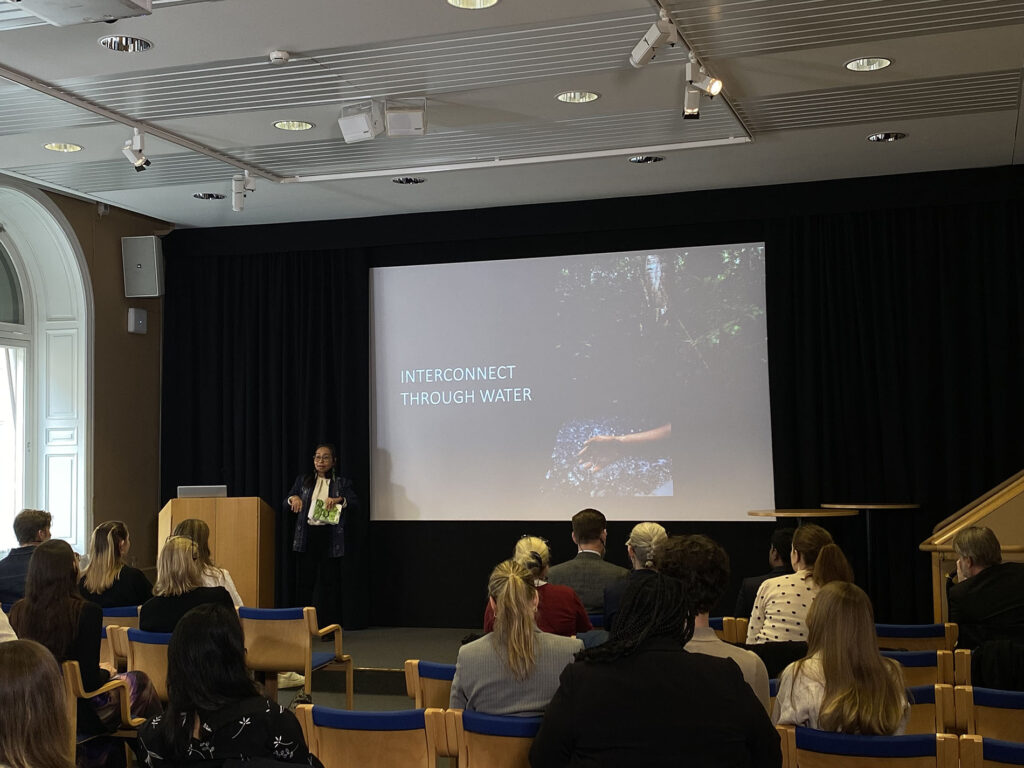As the climate crisis unfolds, farmers across the world face growing problems with droughts and floods. Erratic rainfall patterns and extreme weather events will only get worse and require a greater focus on water management. But solutions exist and countries can often learn from each other, according to experts at a recent seminar.
The event Water for Food Security in a Changing Climate was held in Stockholm on 21 March, in the lead-up to World Water Day. The timing was no coincidence – the organizers at SIANI, SIWI/Swedish Water House and the Swedish University of Agricultural Sciences (SLU) wanted to raise awareness of the critical role of water for food security. Here you can watch a recording of the session.
Food security will require investments in water management
The day’s first keynote speaker Jennie Barron is Professor at SLU and an expert in agricultural water management. She warned of the consequences for agriculture when climate change impacts the water cycle so that farming gets increasingly difficult. The growing threats from droughts and floods can be seen in different parts of the world, sometimes with unexpected indirect consequences also in far-away places.
Barron took Sweden as an example, where food security is much more threatened by water risks than most people may be aware. She noted that half the food consumed in Sweden is imported, often from water stressed countries. Recently, big food producers like the USA and India have faced droughts, sometimes making them less able or willing to produce for the global market, with India’s ban on rice exports as a highly publicized example.
At the same time, Swedish farmers have had their own share of water-related problems. Cereal yields fell by 30% in 2023 after a growing season that started with an exceptional drought followed by unusual rains. For the future, the agricultural sector will need to undergo major transformations, but Jennie Barron stressed that this will also create new opportunities:
“There is evidence of many practices in agriculture and water management that can work in synergy for climate resilience and environmentally sustainable food systems.”
Interconnected: water, rainforests and communities
The next keynote speaker, The Tenure Facility’s Executive Director Nonette Royo, spoke on the topic “Interconnected: Water, rainforests and communities in a changing climate”. She urged us to broaden the discussion on climate change, which she felt is often too narrowly focused on rising temperatures and technology to cut emissions. “We can also look at it as an issue of droughts and floods. Climate change is an issue of water,” she said.
Royo described the role of water as a connector, linking forest, wetlands, estuaries, grassland, coasts, lakes, rivers… and the communities who live there. The word “interconnected” is key to understanding this essential bond, not least how Indigenous Peoples serve as guardians of land and water. From this follows that it is essential that people must be consulted on plans that impact water bodies they rely on. The Tenure Facility works very practically to ensure land rights and tenure for Indigenous Peoples.
Who will make the necessary investments?
Sara Gräslund, head of SLU Global, moderated a panel discussion with Sajeevan Radha Sivarajan, Researcher at SLU, Katarina Wolf, President of The Federation of Swedish Farmers’ Youth section (LRF Ungdomen), and Patrik Strömer who is Expert civil defense and food systems at the Swedish Food Federation (Livsmedelsföretagen).
The three panellists all agreed that solutions exist and that major transformations are needed. Sajeevan Radha Sivarajan, who studies plants’ stress responses, pointed to the potential of more resilient crops, smarter water practices and more precise irrigation.
But transformations are neither easy nor cheap; many speakers referred to a recent study from The Federation of Swedish Farmers that estimates the cost of “the green transformation” of Swedish agriculture to 20 billion Swedish crowns (SEK) annually. Patrik Strömer wanted to see a more open debate about these costs, not shying away from necessary tradeoffs. Katarina Wolf noted the low profitability of Swedish farmers, saying that they cannot shoulder the costs of the transformation on their own.
The day’s other moderator, WWF Sweden’s water resources expert Mats Johansson, asked the panelists to name a change they think could be achieved within three years. Sajeevan believed in upscaling of good water management practices, and Katarina thought consumers could change their behaviour and begin to place a higher value on food. Patrik felt wars like in Ukraine could make people more aware of threats to food security.
Inspiring examples of tested solutions
To showcase potential solutions, two innovative companies had also been invited. Filippa Möller, marketing assistant, presented Spowdi’s drip irrigation system that is powered by solar energy. Nicola Parfitt, Project Manager, described Sanitation 360’s solution where processed urine is used for fertilization.
The Swedish government was present, with a presentation by Anders Drottja, Political Advisor to the Swedish Minister for Rural Affairs. Drottja described the government’s great interest in this issue and the funding provided for research on resilient crops.
Wrapping up the day, Swedish Water House’s Director Thomas Rebermark advertised a new Multi-stakeholder Group on Water, agriculture and climate to continue the conversation about the role of water for food security. It will likely remain one of the most critical challenges for many years to come.
